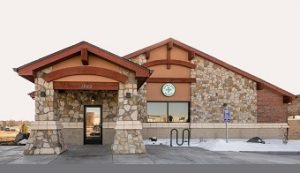
Most retailers invest in a video surveillance solution to improve security. Many also use it as an investigation tool to help resolve customer disputes, liability claims and reduce losses from theft and fraud. Complete Releaf relies on its intelligent video solution for all of those reasons, however compliance with state regulations was the primary objective when CEO and owner Eric Ryant started looking for a video system for his new, 3,000 square foot cannabis dispensary in Lafayette, Colorado.
Unlike many other types of retail environments, cannabis dispensaries must comply with strict rules governing the type of video surveillance equipment used, where cameras and equipment are placed, and how long video evidence must be retained. Already familiar with the regulations based on his experience operating a second dispensary and a cultivation center in Lafayette, Colorado, Ryant sourced multiple bids for his new video solution.
“Once all the bids were in, I went through the process of analysing each one and ended up narrowing the contenders down to two,” said Ryant. “In the end, I selected the March Networks proposal from our systems integrator, Falcon Networks. The solution had everything I was looking for, including POS integration, and additional capabilities I thought might be useful down the road. It met all of the compliance criteria, and the price was comparable.”
Prior to opening the boutique dispensary in January 2018, Ryant worked with its system integrator to design and install a fully-compliant video solution. Today, IR dome cameras mounted inside the dispensary capture clear 4MP video of all activity at entrances and exits, in storage and equipment rooms, and at each point-of-sale (POS) system. In addition, 360° cameras are installed above the sales floor and in every corner to provide further panoramic coverage. The 360° cameras are also installed on the dispensary’s exterior to capture people entering and exiting, as well as any activity in the surrounding parking lot and back loading area.
The cameras were selected and placed strategically to ensure that the system meets multiple legislated requirements, such as recording all activity occurring within 20 feet of any ingress/egress point, capturing clear video in all lighting conditions, and making sure that the recorded video is sharp enough to identify customer and employee facial features at each POS.
At the center of Complete Releaf’s video solution is a hybrid network video recorder (NVR). The recorder provides IP and analog video capture and unparalleled reliability through features such as diagnostic LEDs, an internal battery backup, and a customised embedded Linux operating system. All IP channel licenses are included with the recorder, making it a convenient and cost-effective option for the dispensary.
Equally important, the recorder provides Complete Releaf with 32TB of internal storage, so it is compliant with the state’s 40-day video retention requirement. “Essentially, we need 100 percent coverage with no ‘blind spots’ on our retail floor, and a clear picture of people’s faces. It’s a truly reliable product, and we’ve had no difficulties achieving our 40 days of archived video,” said Ryant. While security and compliance were both top priorities for Ryant, finding a video solution that would also help him run Complete Releaf more efficiently – and profitably – was also important. That’s why he’s so pleased with the March Networks Searchlight for Retail application software he is also using.
The intelligent software enables Ryant and his team to proactively identify and review suspect transactions using integrated video and transaction data pulled from the dispensary’s Green Bits POS system. It provides them with an easy-to-use loss prevention tool that reduces the time it takes to investigate incidents from hours to minutes. It also arms them with strong video and data evidence to support successful prosecutions or recoveries. Ryant is also testing the Searchlight application in his cultivation facility, taking advantage of the software’s ability to integrate with data from the Radio Frequency Identification (RFID) tags he is required to add to each plant through the cultivation process as part of Colorado’s Inventory Tracking System (Metrc).
The software would enable Ryant to leverage his RFID investment by making the data searchable in the dashboard and tying it to recorded video. If there’s ever an incident during the cultivation process, Ryant could use the software to easily locate the video footage to see what actually happened and who was involved











